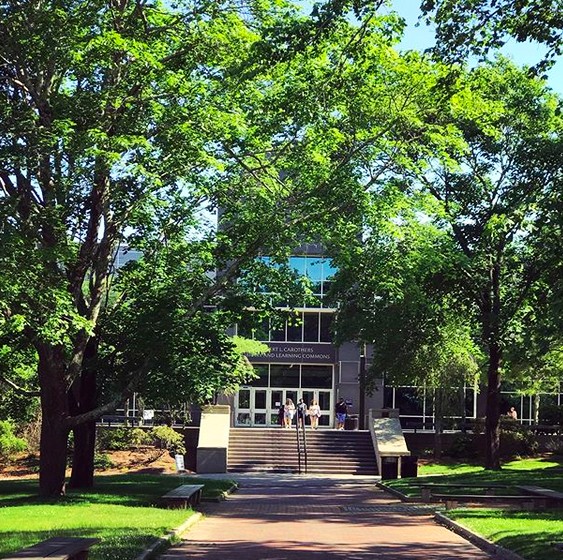Photo courtesy of the University of Rhode Island’s Summer Sessions Instagram.
This is a developing story. For the most up-to-date information, follow @RhodyCigar and our staff on Twitter. You can also go to our website for more coverage.
While some details have become clearer as the University of Rhode Island begins remote learning this week due to the COVID-19 pandemic, students and staff still feel uncertain as to what will come next.
Last week, the University announced that in-person classes would be replaced with remote learning for the remainder of the semester. This is part of a worldwide effort to promote social distancing to avoid the spread of the virus. The announcement came just under a week after the University had already decided to shift to remote learning through April 3 after canceling face-to-face classes from March 16 to March 20. That extra week was designed to give faculty time to prepare to teach their classes online and allow the University more time to see how the pandemic would pan out.
Kathy Collins, the vice president for student affairs, said last Thursday that the University’s senior leadership had been considering what would be the best move for the community. This team continuously saw news of increasing numbers of COVID-19 cases across the country and in Rhode Island.
“We just thought ‘hey, we have to do this,’” Collins said. “So everything really came together in a positive way that gave us great confidence in making that decision.”
The decision came just hours before the University announced via email its first confirmed case of the virus.
The affected individual, a staff member, was recovering at home as of last Thursday, according to Director of Health Services Ellen Reynolds. The Rhode Island Department of Health (RIDOH) has notified people who had come into contact with the staff member.
One of the biggest questions left unanswered in the wake of these changes is if, how or when this year’s commencement ceremony will convene. It was originally scheduled for Saturday, May 16 and Sunday, May 17.
A decision on commencement will be announced tomorrow on Tuesday, March 24. Three students, including current Student Senate President Nick Marotta, are part of the larger committee working on the decision.
In the event that the University is unable to hold a traditional in-person commencement, Collins assured that there will be something in place of it.
“We understand the importance of commencement,” Collins said. “It’s so important. I think the University is going to creatively come up with something cool.”
It is also unknown what will happen regarding student employment, including work study, which many students at the University benefit from. Seven cents of every dollar paid to work-study students comes from the federal government, with the remaining 30 cents coming from the University.
“We needed to wait [to do anything] because we were waiting on guidance from work-study from the federal government,” Collins said. “We’re waiting on that just like every university in the country is.”
According to Collins, the senior leadership would discuss that in their meeting on Monday, March 23. At the time of original publication, the decision has not yet been released.
Students have until 8 p.m. on Sunday, April 5 to move out from their dormitories if they want to receive the 25 percent refund on housing costs for the semester.
Students who are unable to come to campus to collect their belongings have the option to send a proxy person to collect their things on their behalf, or they can contact the Department of Housing and Residential Life customer service, who will work out other accommodations with Health Services and Disability Services, according to Reynolds. This could be an option for students who are unable to secure a proxy by April 5 or are unable to come to campus due to COVID-19 related concerns.
Reynolds believes that the housing staff has been doing an excellent job in minimizing the number of people moving out in the residence halls at any given time in the name of social distancing.
“If individuals need even further protection, we are working with individuals on that and I am aware that that is available for those people who need it,” Reynolds said.
Health Services is continuing to offer tests to people in the URI community who are showing symptoms of the virus and meet other criteria that put them at a higher risk for hospitalization and serious complications from the disease.
In terms of personal protective equipment for healthcare providers, Health Services is in good shape – so good, in fact, that they’ve been able to donate some to the RIDOH.
“For some pieces, we had more than we needed with the outpouring from the community including the College of Nursing, the College of Environmental and Life Sciences and others who have maybe used this equipment in their labs or other places, and they know that we have essential healthcare workers who need it,” said Reynolds.
While students can receive refunds for housing costs, they won’t be seeing any reimbursements for other tuition costs, according to Vice Provost for Enrollment Management Dean Libutti.
It’s still too early to tell what the response to the COVID-19 pandemic from the Federal Aid system will be, according to Libutti, but that the University is anticipating that some students may see a change in their needs.
“Students and families from all over the world are being impacted by COVID-19 in so many ways,” Libutti said. “[And] we do anticipate that a student’s financial need may change for next year.”

